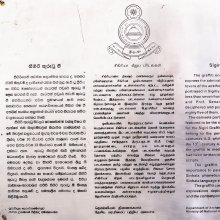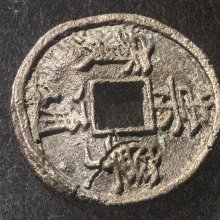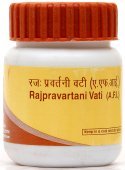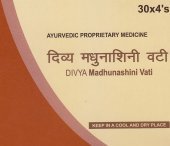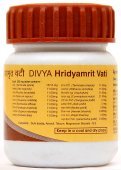Vati, Vāti, Vāṭī, Vatī, Vaṭi: 21 definitions
Introduction:
Vati means something in Hinduism, Sanskrit, Buddhism, Pali, the history of ancient India, Marathi, Hindi, biology, Tamil. If you want to know the exact meaning, history, etymology or English translation of this term then check out the descriptions on this page. Add your comment or reference to a book if you want to contribute to this summary article.
Images (photo gallery)
In Hinduism
Ayurveda (science of life)
Kalpa (Formulas, Drug prescriptions and other Medicinal preparations)
Source: Shodhganga: Edition translation and critical study of yogasarasamgrahaVaṭi (वटि, “pill”) is another name for Gulikā, a Sanskrit technical term appearing in the 15th-century Yogasārasaṅgraha (Yogasara-saṅgraha) by Vāsudeva..—When the powdered drugs are mixed with the syrup of jaggary, sugar or guggulu or ground with water, milk or svarasa and made balls and dried it is known as Guḷikā [Gulikā]. Vaṭaka, vaṭi, modaka, vaṭikā, piṇḍī and varti are its synonyms.
Unclassified Ayurveda definitions
Source: Wisdom Library: Āyurveda and botanyVāṭī (वाटी) is a Sanskrit word referring to a kind of aquatic bird (“grede”). The meat of this animal is part of the māṃsavarga (‘group of flesh’), which is used throughout Ayurvedic literature. The animal Vāṭī is part of the sub-group named Ambucārin, refering to animals “which move on waters”. It was classified by Caraka in his Carakasaṃhitā sūtrasthāna (chapter 27), a classical Ayurvedic work. Caraka defined such groups (vargas) based on the dietic properties of the substance.

Āyurveda (आयुर्वेद, ayurveda) is a branch of Indian science dealing with medicine, herbalism, taxology, anatomy, surgery, alchemy and related topics. Traditional practice of Āyurveda in ancient India dates back to at least the first millenium BC. Literature is commonly written in Sanskrit using various poetic metres.
Vyakarana (Sanskrit grammar)
Source: Wikisource: A dictionary of Sanskrit grammar1) Vati (वति).—tad. affix वत् (vat) in the sense of similar activity or thing; e. g. राजवद्वर्तते, मथुरावत् स्त्रुघ्ने प्राकारः (rājavadvartate, mathurāvat strughne prākāraḥ); cf. तेन तुल्यं क्रिया चेद्वतिः । तत्र तस्येव (tena tulyaṃ kriyā cedvatiḥ | tatra tasyeva) P.V.1.115, 116;
2) Vati.—tad. affix वत् (vat) in the sense of deserving;e.g, राजवत् पालनम् (rājavat pālanam) ; cf. तदर्हम् (tadarham) P.V.1.117;
3) Vati.—tad. affix वत् (vat) applied to prefixes in Vedic Literature without any sense of its own ; e.g यदुद्वतो निवतो याति बप्सत् (yadudvato nivato yāti bapsat); cf. उपसर्गा-च्छन्दसि धात्वर्थे (upasargā-cchandasi dhātvarthe) P.V. 1. 118.
--- OR ---
Vatī (वती).—The possessive affix वत् (vat) (मतुप् (matup)) with fem. ई (ī) added; cf. विश्वदेव्यसोमौ वत्याम् (viśvadevyasomau vatyām) (दीर्धमापद्येते (dīrdhamāpadyete)) V.Pr.III.117.

Vyakarana (व्याकरण, vyākaraṇa) refers to Sanskrit grammar and represents one of the six additional sciences (vedanga) to be studied along with the Vedas. Vyakarana concerns itself with the rules of Sanskrit grammar and linguistic analysis in order to establish the correct context of words and sentences.
Kavya (poetry)
Source: archive.org: Naisadhacarita of SriharsaVaṭī (वटी) refers to a “small cowrie” (an insignificant amount), and is mentioned in the Naiṣadha-carita 7.79 (“jātaṃ vaṭīmapyadhunā na labdhum”: “not even worth a chowrie”). [...] In verse 2.88 and 3.88 varāṭikā is used in the sense of a cowrie. There is a “varāṭikāsapramīvrata” in which any food bought at a price of three cowries should be taken. See citation from Bhaviṣyatpurāṇa in Kṛtyakalpataru (Vratakāṇḍa), p. 184. The form varāṭa occurs in Naiṣadhacarita 22.13.

Kavya (काव्य, kavya) refers to Sanskrit poetry, a popular ancient Indian tradition of literature. There have been many Sanskrit poets over the ages, hailing from ancient India and beyond. This topic includes mahakavya, or ‘epic poetry’ and natya, or ‘dramatic poetry’.
India history and geography
Source: Cologne Digital Sanskrit Dictionaries: Indian Epigraphical GlossaryVa-ti.—(IE 8-1), contraction of vadya-pakṣa-tithi, though va may be a mistake for ba (bahula). Note: va-ti is defined in the “Indian epigraphical glossary” as it can be found on ancient inscriptions commonly written in Sanskrit, Prakrit or Dravidian languages.
--- OR ---
Vāṭi or Vāṭī.—(IE 8-6; EI 28, 30), also called vāṭikā (q. v.); land measure equal to twenty māṇas in Orissa. Note: vāṭi is defined in the “Indian epigraphical glossary” as it can be found on ancient inscriptions commonly written in Sanskrit, Prakrit or Dravidian languages.
--- OR ---
Vā-ṭī.—abbreviation of vāstu-ṭīkara, ‘a mound containing land suitable for building houses.’ See Ep. Ind., Vol. XXX, p. 56. Note: vā-ṭī is defined in the “Indian epigraphical glossary” as it can be found on ancient inscriptions commonly written in Sanskrit, Prakrit or Dravidian languages.

The history of India traces the identification of countries, villages, towns and other regions of India, as well as mythology, zoology, royal dynasties, rulers, tribes, local festivities and traditions and regional languages. Ancient India enjoyed religious freedom and encourages the path of Dharma, a concept common to Buddhism, Hinduism, and Jainism.
Biology (plants and animals)
Source: Google Books: CRC World Dictionary (Regional names)1) Vati in India is the name of a plant defined with Ficus benghalensis in various botanical sources. This page contains potential references in Ayurveda, modern medicine, and other folk traditions or local practices It has the synonym Ficus cotonifolia Stokes (among others).
2) Vati is also identified with Ficus lacor.
Example references for further research on medicinal uses or toxicity (see latin names for full list):
· Enumeratio plantarum (1805)
· Species Plantarum
· Ann. Mus. Bot. Lugduno-Batavi (1867)
· Transactions of the Linnean Society of London (1827)
· Bot. Mat. Med. (1812)
· Plant Systematics and Evolution (1987)
If you are looking for specific details regarding Vati, for example diet and recipes, health benefits, side effects, pregnancy safety, extract dosage, chemical composition, have a look at these references.

This sections includes definitions from the five kingdoms of living things: Animals, Plants, Fungi, Protists and Monera. It will include both the official binomial nomenclature (scientific names usually in Latin) as well as regional spellings and variants.
Languages of India and abroad
Pali-English dictionary
Source: BuddhaSasana: Concise Pali-English Dictionaryvati : (f.) a fence. || vāti (vā + a) blows; emits some smell.
Source: Sutta: The Pali Text Society's Pali-English Dictionary1) Vati, 2 (f.) (fr. vṛ, cp. Sk. vṛti) a choice, boon DhA. I, 190 (pubbe Sāmā nāma vatiyā pana kāritattā Sāmāvatī nāma jātā). (Page 597)
2) Vati, 1 (f.) (later Sk. vṛti, fr. vṛ) a fence J. I, 153; III, 272; V, 472; Vism. 186 (vatī, v. l. vati); SnA 98 (v. l. for gutti), 148 (v. l. for °vatikā). (Page 597)
— or —
Vāti, see vāyati (in meaning “weave, ” as well as “blow”). (Page 608)

Pali is the language of the Tipiṭaka, which is the sacred canon of Theravāda Buddhism and contains much of the Buddha’s speech. Closeley related to Sanskrit, both languages are used interchangeably between religions.
Marathi-English dictionary
Source: DDSA: The Molesworth Marathi and English Dictionaryvaṭī (वटी).—See under ओ.
--- OR ---
vāṭī (वाटी).—f A saucer-form vessel of metal. 2 A half of a cocoanut-shell; a thing in general hollow like a cup; the patella or pan of the knee; the cup or bell of a flower; a half-cockle or other bivalvular shell; the cup or collet of the gem (in a ring or other ornament).
Source: DDSA: The Aryabhusan school dictionary, Marathi-Englishvaṭī (वटी).—f A bed or plat. A pill. A cake or pat.
--- OR ---
vāṭī (वाटी).—f A garden, orchard.
--- OR ---
vāṭī (वाटी).—f A saucer-form vessel of metal. A half of a cocoanut-shell.
Marathi is an Indo-European language having over 70 million native speakers people in (predominantly) Maharashtra India. Marathi, like many other Indo-Aryan languages, evolved from early forms of Prakrit, which itself is a subset of Sanskrit, one of the most ancient languages of the world.
Sanskrit dictionary
Source: DDSA: The practical Sanskrit-English dictionaryVaṭi (वटि).—
1) A sort of ant.
2) A kind of insect.
3) See वठिका (vaṭhikā).
Derivable forms: vaṭiḥ (वटिः).
--- OR ---
Vaṭī (वटी).—
1) A rope or string.
2) A pill, bolus.
--- OR ---
Vati (वति).—(vā-'tiḥ nit Uṇādi-sūtra 5.6) The wind. -f. (vanantyalopaḥ jhalādau viṅti P.V1.4.37) Asking, begging.
Derivable forms: vatiḥ (वतिः).
--- OR ---
Vāṭī (वाटी).—
1) The site of a house.
2) A house, dwelling.
3) A court, an enclosure.
4) A garden, park, orchard; वाटीभुवि क्षितिभुजाम् (vāṭībhuvi kṣitibhujām) Āṣval.5; Bhāgavata 1.6.11.
5) A road.
6) The groin.
7) A kind of grain.
--- OR ---
Vāti (वाति).—[vā-ktic]
1) The sun.
2) Wind, air.
3) The moon.
Derivable forms: vātiḥ (वातिः).
Source: Cologne Digital Sanskrit Dictionaries: Shabda-Sagara Sanskrit-English DictionaryVaṭi (वटि).—m.
(-ṭiḥ) A sort of tick or body louse. E. vaṭ to surround, aff. in .
--- OR ---
Vāti (वाति).—m.
(-tiḥ) 1. The sun. 2. The moon. 3. Air, wind. E. vā to go, Unadi aff. ktic .
Source: Cologne Digital Sanskrit Dictionaries: Benfey Sanskrit-English DictionaryVaṭi (वटि).—m. A sort of insect.
--- OR ---
Vāti (वाति).—m. 1. (vb. vā), Air, wind. 2. The sun. 3. The moon.
Source: Cologne Digital Sanskrit Dictionaries: Monier-Williams Sanskrit-English Dictionary1) Vaṭī (वटी):—[from vaṭa > vaṭ] a f. a kind of tree, [Rājan.]
2) [v.s. ...] (with gā-ḍhā) a [particular] position in the game of Catur-aṅga or chess, [cf. Lexicographers, esp. such as amarasiṃha, halāyudha, hemacandra, etc.]
3) [v.s. ...] a little round ball, [cf. Lexicographers, esp. such as amarasiṃha, halāyudha, hemacandra, etc.]
4) Vaṭi (वटि):—[from vaṭ] f. a sort of ant (= divī and upajihvā), [cf. Lexicographers, esp. such as amarasiṃha, halāyudha, hemacandra, etc.]
5) [v.s. ...] a kind of louse or other insect, [cf. Lexicographers, esp. such as amarasiṃha, halāyudha, hemacandra, etc.]
6) Vaṭī (वटी):—[from vaṭ] b See under vaṭa above.
7) Vati (वति):—a See under √1. van, p.917.
8) [from van] b f. ([probably]) asking, begging, [Pāṇini 6-4, 37 [Scholiast or Commentator]]
9) [v.s. ...] = vadi, [Inscriptions]
10) Vāti (वाति):—[from vā] a m. (only [cf. Lexicographers, esp. such as amarasiṃha, halāyudha, hemacandra, etc.]) air, wind
11) [v.s. ...] the sun
12) [v.s. ...] the moon.
13) Vātī (वाती):—[from vā] in [compound] for 1. vāta.
14) Vāṭī (वाटी):—[from vāṭa] f. a piece of enclosed ground, garden, [Harivaṃśa; Sāhitya-darpaṇa; Bhāgavata-purāṇa]
15) [v.s. ...] the site of a house, [cf. Lexicographers, esp. such as amarasiṃha, halāyudha, hemacandra, etc.]
16) [v.s. ...] a hut, [cf. Lexicographers, esp. such as amarasiṃha, halāyudha, hemacandra, etc.]
17) Vāṭi (वाटि):—[from vāṭa] ([probably]) f. a piece of enclosed ground, [Kātyāyana]
18) Vāti (वाति):—b vātula, vatūla, vātya etc. See p. 935, col. 2 etc.
Source: Cologne Digital Sanskrit Dictionaries: Yates Sanskrit-English Dictionary1) Vaṭi (वटि):—(ṭiḥ) 2. m. A sort of tick or body louse.
2) Vāti (वाति):—(tiḥ) 2. m. Air, wind.
Source: DDSA: Paia-sadda-mahannavo; a comprehensive Prakrit Hindi dictionary (S)Vāṭī (वाटी) in the Sanskrit language is related to the Prakrit word: Vāḍī.
[Sanskrit to German]
Sanskrit, also spelled संस्कृतम् (saṃskṛtam), is an ancient language of India commonly seen as the grandmother of the Indo-European language family (even English!). Closely allied with Prakrit and Pali, Sanskrit is more exhaustive in both grammar and terms and has the most extensive collection of literature in the world, greatly surpassing its sister-languages Greek and Latin.
Hindi dictionary
Source: DDSA: A practical Hindi-English dictionaryVaṭī (वटी):—(nf) a pill, a tablet.
...
Kannada-English dictionary
Source: Alar: Kannada-English corpusVaṭi (ವಟಿ):—[noun] = ವಟ [vata]3 - 1 & 2.
--- OR ---
Vati (ವತಿ):—[noun] aregion, place or position with reference to a point, place or region; ವತಿಯಿಂದ [vatiyimda] vatiyinda from (that) side; on behalf of.
--- OR ---
Vāṭi (ವಾಟಿ):—
1) [noun] = ವಾಟ [vata]2 - 3 & 7.
2) [noun] a habitation of animals.
3) [noun] a residence; a house.
4) [noun] the area or exact plot of ground on which anything is, has been or is to be located; a site.
5) [noun] a place where certain goods or services are offered for sale; a small store; a shop.
6) [noun] the part of the body between the ribs and the hips; the waist.
--- OR ---
Vāti (ವಾತಿ):—
1) [noun] air in motion; wind.
2) [noun] Vāyu, the Wind-God.
3) [noun] the sun.
4) [noun] the moon.
--- OR ---
Vāti (ವಾತಿ):—[noun] any of various small gallinaceous birds of the genus Coturnix and family Phasianidae, esp. (more fully common quail) the migratory Coturnix coturnix, which is reared for its edible flesh and eggs.
Kannada is a Dravidian language (as opposed to the Indo-European language family) mainly spoken in the southwestern region of India.
Tamil dictionary
Source: DDSA: University of Madras: Tamil LexiconVaṭi (வடி) [vaṭital] 4 intransitive verb
1. To drip, trickle, as water; ஒழுகுதல். சீழ் வடிகின்றது. [ozhuguthal. sizh vadiginrathu.]
2. To be diminished, as water in a river; to flow back, ebb, as tide; நீர் முதலியன வற்றுதல். வடியாத பவக்கடலும் வடிந்து [nir muthaliyana varruthal. vadiyatha pavakkadalum vadinthu] (அஷ்டப்பிரபந்தம் திருவரங். கலம். [ashdappirapandam thiruvarang. kalam.] 93).
3. To be perfected, as pronunciation; திருந்துதல். வடியா நாவின் [thirunthuthal. vadiya navin] (புறநானூறு [purananuru] 47).
4. To be clear, as sound; தெளிதல். வடிமணிமேகலை நின்றியம்ப [thelithal. vadimani ninriyamba] (புறப்பொருள்வெண்பாமாலை [purapporulvenpamalai] 10, 14, பக். [pag.] 116).
5. To become beautiful; அழகுபெறுதல். வடுவின்று வடிந்த யாக்கையன் [azhaguperuthal. vaduvinru vadintha yakkaiyan] (புறநானூறு [purananuru] 180).
6. To lengthen, become long; நீளுதல். (சூடாமணிநிகண்டு) குழைவிரவு வடிகாதா [niluthal. (sudamaninigandu) kuzhaiviravu vadigatha] (தேவாரம் [thevaram] 1091, 1).
--- OR ---
Vaṭi (வடி) [vaṭittal] 11 transitive verb Causative of வடி¹-. [vadi¹-.]
1. To cause to flow out; to shed, as tears; to drain; வடியச் செய்தல். கட்புனல் வடித்து [vadiyas seythal. kadpunal vadithu] (தனிப்பாடற்றிரட்டு [thanippadarrirattu] i, 351, 73).
2. To strain, as conjee from cooked rice; to filter; வடிகட்டுதல். மற்று மொரு கால் வடித்தெடுத்து [vadigattuthal. marru moru kal vaditheduthu] (தனிப்பாடற்றிரட்டு [thanippadarrirattu] i, 182, 5).
3. To squeeze out; பிழிதல். பன்றிக் கூழ்ப் பத்தரிற் றேமா வடித்தற்றால் [pizhithal. panrig kuzhp patharir rema vaditharral] (நாலடியார் [naladiyar], 257).
4. To distill, as oil; தைலமிறக்குதல். கடத்துற வடி [thailamirakkuthal. kadathura vadi] (தைலவருக்கச்சுருக்கம் தைல. [thailavarukkachurukkam thaila.] 116).
5. To refine, polish; to perfect; திருத்த மாகச் செய்தல். வானுட்கும் வடிநீண் மதில் [thirutha magas seythal. vanudkum vadinin mathil] (புறநானூறு [purananuru] 18).
6. To express in choice language; சார மான சொல்லா லமைதல். வாயினால் வடித்த நுண் ணூல் [sara mana solla lamaithal. vayinal vaditha nun nul] (சீவகசிந்தாமணி [sivagasindamani] 271).
7. To win over; to bring under control; வசமாக்குதல். (சூடாமணிநிகண்டு) [vasamakkuthal. (sudamaninigandu)]
8. To tame, train, as wild elephants; பழக்குதல். கதிக்குற வடிப்போர் கவின்பெறு வீதியும் [pazhakkuthal. kathikkura vadippor kavinperu vithiyum] (மணிமேகலை [manimegalai] 28, 61).
9. To practise; பயிலுதல். வார்சிலை வடிப்ப வீங்கி [payiluthal. varsilai vadippa vingi] (சீவகசிந்தாமணி [sivagasindamani] 1450).
10. To cook, as rice; சோறு சமைத்தல். [soru samaithal.] Colloq.
11. To sharpen; கூராக்குதல். வடித்தாரை வெள்வேல் [kurakkuthal. vaditharai velvel] (சீவகசிந்தாமணி [sivagasindamani] 2320) ((சங்கத்தகராதி) தமிழ்சொல்லகராதி [(sangathagarathi) thamizhsollagarathi])
12. To comb and fasten, as hair; வாரிமுடித்தல். [varimudithal.] (நற்றிணை [narrinai] 23).
13. To flatten out; தகடாக்குதல். இரும்பு வடித்தன்ன மடியா மென்றோல் [thagadakkuthal. irumbu vadithanna madiya menrol] (பத்துப்பாட்டு: பெரும்பாணாற்றுப்படை [pathuppattu: perumbanarruppadai] 222).
14. To lengthen; நீளமாக்குதல். [nilamakkuthal.]
15. To stroke with the fingers over, as the string of a lute in playing; யாழ்நரம்பை உருவுதல். வாரியும் வடித்து முந்தியு முறழ்ந்தும் [yazhnarambai uruvuthal. variyum vadithu munthiyu murazhnthum] (பத்துப்பாட்டு: பொருநராற்றுப்படை [pathuppattu: porunararruppadai] 23).
16. To equip, as a horse; அலங்கரித்தல். வடித்த போத்தொடு [alangarithal. vaditha pothodu] (சீவகசிந்தாமணி [sivagasindamani] 1773).
17. To investigate, examine; ஆராய்தல். வடித்த நூற்கேள்வியார் [araythal. vaditha nurkelviyar] (சீவகசிந்தாமணி [sivagasindamani] 1846).
18. To select, choose; ஆராய்ந்தெடுத்தல். மார னிக்குவில்வளைத் தலர்க்கணை வடித்து [arayntheduthal. mara nikkuvilvalaith thalarkkanai vadithu] (பிரபோதசந்திரோதயம் [pirapothasandirothayam] 30, 59).
19. To pluck, nip; கிள்ளியெடுத்தல். கிளிபோல் காய கிளைத்துணர் வடித்து [killiyeduthal. kilipol kaya kilaithunar vadithu] (அகநா. [agana.] 37).
--- OR ---
Vati (வதி) [vaṭi] noun < வடி¹-. [vadi¹-.]
1. Honey; தேன். வடிமலர் வள்ளம் [then. vadimalar vallam] (சூளாமணி இரத. [sulamani iratha.] 45). வடிகொள் பொழி லின் [vadigol pozhi lin] (தேவாரம் [thevaram] 116, 3).
2. Toddy; கள். (பிங்கலகண்டு) [kal. (pingalagandu)]
3. Lengthening; நீளுகை. (அரு. நி.) [nilugai. (aru. ni.)]
--- OR ---
Vaṭi (வடி) noun < வடி²-. [vadi²-.]
1. Filtration, distillation; வடித்தெடுக்கை. வடியுறு தீந்தேறல் [vadithedukkai. vadiyuru thintheral] (புறப்பொருள்வெண்பாமாலை [purapporulvenpamalai] 1, 19).
2. Sharpness; கூர்மை. வடியாரு மூவிலை வேல் [kurmai. vadiyaru muvilai vel] (தேவாரம் [thevaram] 830, 6). (நாமதீபநிகண்டு [namathipanigandu])
3. Combing and fastening, as of the hair; வாரிமுடிக்கை. வடிக்கொள் கூழை யாயமொடு [varimudikkai. vadikkol kuzhai yayamodu] (நற்றிணை [narrinai] 23).
4. Scrutiny, investigation; ஆராய்ச்சி. வடியமை [araychi. vadiyamai] (சீவகசிந்தாமணி [sivagasindamani] 1685, உரை [urai]).
5. See வடிகயிறு. (யாழ்ப்பாணத்து மானிப்பாயகராதி) [vadigayiru. (yazhppanathu manippayagarathi)]
6. Rope; கயிறு. (யாழ்ப்பாணத்து மானிப்பாயகராதி) [kayiru. (yazhppanathu manippayagarathi)]
7. cf. பட்டி¹. [patti¹.] Dog; நாய். (சதுராகராதி) [nay. (sathuragarathi)]
--- OR ---
Vaṭi (வடி) noun cf. வடு¹. [vadu¹.]
1. Tender, green mango; மாம்பிஞ்சு. நெடுமரக் கொக்கி னறுவடி விதிர்த்த [mambinchu. nedumarag kokki naruvadi vithirtha] (பத்துப்பாட்டு: பெரும்பாணாற்றுப்படை [pathuppattu: perumbanarruppadai] 309).
2. Piece of green mango, cut longitudinally in two; மாம்பிஞ்சின் பிளவு. வடியன்ன வுண்கட்கு [mambinchin pilavu. vadiyanna vunkadku] (கலித்தொகை [kalithogai] 64).
--- OR ---
Vaṭi (வடி) noun cf. வளி. [vali.] Wind; காற்று. வடி பட வியங்கும் வண்ணக் கதலிகை [karru. vadi pada viyangum vannag kathaligai] (பெருங்கதை மகத. [perungathai magatha.] 3, 36).
--- OR ---
Vaṭi (வடி) noun cf. வடிவு¹. [vadivu¹.] Form, shape; உரு வம். கரியது வடிகொடு [uru vam. kariyathu vadigodu] (தேவாரம் [thevaram] 815, 5).
--- OR ---
Vaṭi (வடி) noun [Telugu: baḍita, K. baḍi, M. vaḍi.] Small cane or stick; சிறுதடி. [siruthadi.] Nāñ.
--- OR ---
Vati (வதி) [vatital] 4 intransitive verb < vas.
1. To dwell, abide; to sojourn, stay; தங்குதல். வதிமண வம்பலர் வாயவிழ்ந் தன்னார் [thanguthal. vathimana vambalar vayavizhn thannar] (பரிபாடல் [paripadal] 10, 20).
2. To sleep; துயிலுதல். ஆற்றா ணினையுநளவெண்பா் வதிந்தக்கால் [thuyiluthal. arra ninaiyunal vathinthakkal] (கலித்தொகை [kalithogai] 126).
--- OR ---
Vati (வதி) noun < வதி¹-. [vathi¹-.]
1. Lair, nest; விலங்கு முதலியன தங்குமிடம். மாவதிசேர [vilangu muthaliyana thangumidam. mavathisera] (கலித்தொகை [kalithogai] 119).
2. Mire; சேறு. செங்கயல் வதிக்குதி கொளும் புனலது [seru. sengayal vathikkuthi kolum punalathu] (தேவாரம் [thevaram] 413, 7). (பிங்கலகண்டு [pingalagandu])
--- OR ---
Vati (வதி) [vatittal] 11 transitive verb < vadh. See வதை²-. [vathai²-.]
--- OR ---
Vati (வதி) noun cf. pathin.
1. Way; வழி. (பிங்கலகண்டு) தனிவதி யியக்கர் காட்ட [vazhi. (pingalagandu) thanivathi yiyakkar katta] (மகாபாரதம் அருச்சுனன்றவ. [magaparatham aruchunanrava.] 27).
2. Channel; head of a channel; கால்வாய். முக்கோலகலத்தால் வதியட்டிக் கீழ்க்கடைநீர் போவதாகவும் [kalvay. mukkolagalathal vathiyattig kizhkkadainir povathagavum] (S. I. I. vi, 147).
--- OR ---
Vāṭi (வாடி) noun < idem. A sensitive plant. See தொட்டால்வாடி [thottalvadi], 1. (வைத்திய மூலிகை [vaithiya muligai])
--- OR ---
Vāṭi (வாடி) noun < vāṭī.
1. Garden; தோட் டம். [thod dam.] (W.)
2. Wall; மதில். (யாழ்ப்பாணத்து மானிப்பாயகராதி) [mathil. (yazhppanathu manippayagarathi)]
3. Courtyard; முற்றம். (யாழ்ப்பாணத்து மானிப்பாயகராதி) [murram. (yazhppanathu manippayagarathi)]
4. House; வீடு. (யாழ்ப்பாணத்து மானிப்பாயகராதி) [vidu. (yazhppanathu manippayagarathi)]
5. Fish-curing yard; மீனுலர்த்து மிடம். [minularthu midam.] Local usage
6. Village, hamlet; பட்டி. [patti.]
7. Rest-house; சாவடி. வாடிவீடு. [savadi. vadividu.]
8. Hut of bamboo and grass, of kāṇi-k-kārar; காணிக்காரரின் புல் வேய்ந்த மூங்கிற் குடிசை. [kanikkararin pul veyntha mungir kudisai.] (G. T n. D. I , 7.)
9. Enlosure, fenced place; அடைப்பிடம். [adaippidam.] (W.)
10. Yard, shed where firewood is stored for sale; விறகு மரம் முதலியன விற்குமிடம். விறகுவாடி, மர வாடி. [viragu maram muthaliyana virkumidam. viraguvadi, mara vadi.]
--- OR ---
Vāti (வாதி) [vātittal] 11 transitive verb < bādh.
1. To torment, afflict, trouble; வருத்துதல். மாவலி வாதிக்க வாதிப்புண்டு [varuthuthal. mavali vathikka vathippundu] (நாலாயிர திவ்யப்பிரபந்தம் திருவாய்மொழி [nalayira thivyappirapandam thiruvaymozhi] 7, 5, 6).
2. To hinder, obstruct; தடுத்தல். தத்தங் குடிமை யான் வாதிக்கப்பட்டு [thaduthal. thathang kudimai yan vathikkappattu] (நாலடியார் [naladiyar], 66).
--- OR ---
Vāti (வாதி) noun < bādhin. Tormentor; வருந்துபவன். அன்றயன் சிரமொன்றற வாதியே [varunthupavan. anrayan siramonrara vathiye] (சிவதருமோத்தரம் கோபுர. [sivatharumotharam kopura.] 223).
--- OR ---
Vāti (வாதி) [vātittal] 11 transitive verb < vāda. To argue, dispute; to asseverate; வாதாடுதல். [vathaduthal.]
--- OR ---
Vāti (வாதி) noun < vādin.
1. One who advocates; எடுத்துப்பேசுபவன். சோற்றுத் துறை யர்க்கே வாதியாய்ப் பணிசெய் [eduthuppesupavan. sorruth thurai yarkke vathiyayp panisey] (தேவாரம் [thevaram] 391, 4).
2. Disputant, debater; தருக்கிப்பவன். வாதிகையன்ன கவைக்கதி ரிறைஞ்சி [tharukkippavan. vathigaiyanna kavaikkathi rirainchi] (பத்துப்பாட்டு: மலை [pathuppattu: malai] 112).
3. Complainant, plaintiff; opposed to pirati-vāti; வழக்குத்தொடுப் போன். [vazhakkuthodup pon.]
4. Scholar who by adducing reasons and quoting authorities confutes the statements of his opponent and establishes his own, one of four pulamaiyōr, q.v.; புலமையோர் நால்வருள், வாதில் ஏதுவும் மேற்கோளு மெடுத்துக்காட்டிப் பிறர் கோள்மறுத்துத் தன்கொள்கையை நிலைநிறுத்து வோன். [pulamaiyor nalvarul, vathil ethuvum merkolu meduthukkattip pirar kolmaruthuth thankolkaiyai nilainiruthu von.] (யாப்பருங்கலம் விருத்தி பக். [yapparungalam viruthi pag.] 514.) (பிங்கலகண்டு [pingalagandu])
5. Alchemist; இரசவாதி. தோன்றினன் மனமருள் செய்வதோர் வாதி [irasavathi. thonrinan manamarul seyvathor vathi] (கந்தபு. மார்க். [kanthapu. mark.] 116).
6. (Music) See வாதிஸ்வரம். [vathisvaram.]
Tamil is an ancient language of India from the Dravidian family spoken by roughly 250 million people mainly in southern India and Sri Lanka.
Nepali dictionary
Source: unoes: Nepali-English Dictionary1) Vaṭī (वटी):—n. fem. of वटा [vaṭā]
2) Vaṭī (वटी):—n. 1. a globule; lamp; (round) tablet; pill; 2. a rope; a string; 3. → फुरौला [phuraulā]
Nepali is the primary language of the Nepalese people counting almost 20 million native speakers. The country of Nepal is situated in the Himalaya mountain range to the north of India.
See also (Relevant definitions)
Starts with (+63): Vatibha, Vatica astrotricha, Vatica cinerea, Vatica diospyroides, Vatica lanceifolia, Vatica oblongifolia, Vatica odorata, Vatica rassak, Vatical, Vaticam, Vaticarkatu, Vaticatukkam, Vatidirgha, Vatiga, Vatigagama, Vatigama, Vatigamgana, Vatigilike, Vatihuli, Vatika.
Ends with (+1216): Abhajanibhavati, Abhasibhavati, Abhayavati, Abhibhavati, Abhiddavati, Abhidhavati, Abhijavati, Abhijnavati, Abhinavanarayanendra sarasvati, Abhiravati, Abhisambhavati, Abhisavati, Abhishekavati, Abhistavati, Abhitthavati, Abhyasannibhavati, Abhyasibhavati, Acaravati, Aciravati, Acirvati.
Full-text (+1531): Vadi, Pushpavati, Vatim, Vatika, Vivat, Raktavati, Satyavant, Vataga, Suvarnavat, Putpavati, Irattavati, Taccavati, Koshavant, Margavati, Kantavati, Tirthavant, Nolampavati, Karmavati, Vatimani, Madhuvati.
Relevant text
Search found 69 books and stories containing Vati, Va-ti, Vā-ṭī, Vaadi, Vaathi, Vadhi, Vadi, Vathi, Vāti, Vāṭī, Vaṭī, Vatī, Vaṭi, Vāṭi, Vātī; (plurals include: Vatis, tis, ṭīs, Vaadis, Vaathis, Vadhis, Vadis, Vathis, Vātis, Vāṭīs, Vaṭīs, Vatīs, Vaṭis, Vāṭis, Vātīs). You can also click to the full overview containing English textual excerpts. Below are direct links for the most relevant articles:
Sahitya-kaumudi by Baladeva Vidyabhushana (by Gaurapada Dāsa)
Text 10.5 < [Chapter 10 - Ornaments of Meaning]
Text 10.3 < [Chapter 10 - Ornaments of Meaning]
Text 10.108 < [Chapter 10 - Ornaments of Meaning]
Vakyapadiya of Bhartrihari (by K. A. Subramania Iyer)
Verse 3.14.583 < [Book 3 - Pada-kāṇḍa (14): Vṛtti-samuddeśa (On Ccomplex Formation)]
Verse 3.14.544 < [Book 3 - Pada-kāṇḍa (14): Vṛtti-samuddeśa (On Ccomplex Formation)]
Verse 3.14.587 < [Book 3 - Pada-kāṇḍa (14): Vṛtti-samuddeśa (On Ccomplex Formation)]
Rig Veda (translation and commentary) (by H. H. Wilson)
Impact of Vedic Culture on Society (by Kaushik Acharya)
Samucitameya (Land Measures) < [Chapter 5]
Sanskrit Inscriptions (G): The Cālukyas < [Chapter 3]
Manusmriti with the Commentary of Medhatithi (by Ganganatha Jha)
Verse 4.122 < [Section XIII - Days unfit for Study]
Verse 11.113 < [Section XI - Expiation of “Minor Offences”: Cow-killing (goghna)]
Verse 1.58 < [Section XXXIII - Origin of the Law]
Temples in and around Madurantakam (by B. Mekala)
The Nambis and Vaikanasas < [Chapter 6 - Social and Economic Activities]
Related products
(+27 more products available)


